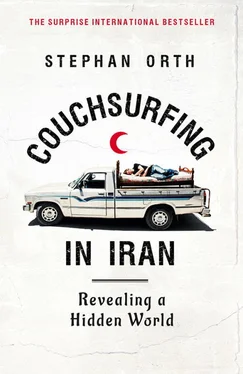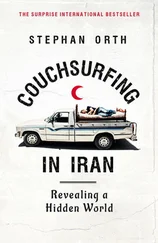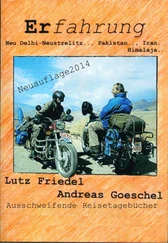Amir asks me how I’m enjoying Iran. I praise the friendliness of the people and the museums and palaces. Yasmin explains to all how funny I looked in the shah costume. Only Kaveh ambles silently beside us; he speaks little English and is in a bad mood because someone stole his wallet in the subway.
Five of us saunter to a café in the middle of the park. From the terrace we have a magnificent view of the Elburz mountain range, whose white peaks tower above the sea of houses and the top of the Milad Tower, one of the tallest TV towers in the world. Below the railings there is an artificial lake with concrete banks, where small children check out the fat ducks and make quacking noises. We move three plastic tables, numbered 33, 34, and 35, together, as we are expecting more guests. Then we sit down and order water and tea.
We made the introductions at the entrance to the park. Now follows the second round: one after the other, Yasmin points to Farshad, Amir, Kaveh, and herself. “Slave, Master, Master, Mistress,” she says. Then, grinning, she points toward me and adds: “Undecided.”
Yasmin organized the meeting via an Internet forum. If the police realized what we were speaking about, we would be arrested. The plan for the next hour? “We start off with the theory and then test it out on you,” suggests the slave Farshad. “We could strap you to the table and then show you something about Iranian hospitality.” Two Masters and a Mistress buckle with laughter. I join in rather sheepishly.
I prefer Yasmin’s version of the day’s schedule: “We will discuss our relationships, techniques, and… er… just about everything else,” she says. The group meets every month at a different venue, which Yasmin announces only a few hours beforehand. “Meeting at home wouldn’t be possible with so many people; it would be too conspicuous.”
Farshad is thirty-two, with neatly combed hair kept in place with hair gel and gentle brown eyes, and is wearing a light blue shirt. “You know, we see allusions everywhere. Look, your water is called oxub . That sounds like a shortened form of ‘submission.’ You could also make a fine strap-on dildo from the bottle, a bit on the large size, but it’d only hurt at the beginning and pretty soon you’d be in a trance.”
Farshad asks me what I know about BDSM. I say it’s about dominance, role-playing, and pain, and I know the enthusiasm of the Iranian clergy toward it is not overwhelming. “It’s crazy, really, when you consider that Imam Husayn fought for freedom, but there’s no freedom for us,” says Amir, a man in peak condition, with round glasses and a bald head. Iran’s Shiites venerate Husayn, grandson of the Prophet Muhammad, who died for his beliefs at the legendary Battle of Karbala. Every year during Muharram (the first month of the Islamic calendar), Shiites mourn his death, and some devotees practice the tradition of self-flagellation.
“Hasn’t that also got something sadomasochistic about it?” I ask.
“Sometimes. Believers want to repent, to free themselves from their sins via pain,” explains Farshad. In the meantime, self-flagellation is officially forbidden, but this does not in any way deter people from practicing it. Every year the ritual is repeated.
“For me it’s not about repentance, but rather about passing on responsibility to someone else,” says Farshad, who is employed by a law firm. “The most important thing is trust. You can compare it to a bird in a cage; it is completely dependent on the owner, totally at his mercy. This external domination can be very relaxing; afterward you feel reborn.”
Give me a dictator who can convince me that he means well, and I will follow him.
Amir adds: “It’s all about switching off logical thought, simply to feel that even something irrational can be pleasant. Many people repress this. But the success of Fifty Shades of Grey [1] James, E.L. Fifty Shades of Grey. New York: Vintage Books, 2012.
shows how many secretly feel it.”
“Can you buy the book here?” I ask.
“Of course not. Nobody here would be allowed to read it.”
Now and then the conversation drifts into Persian, and then I only understand a few English words like “sadist,” “domination,” or “submission.” There does not appear to be adequate Persian words for such terms. Farshad notices that I’m struggling to follow the conversation. “We’re just discussing what we are going to do with you,” he explains with the heartiest laugh imaginable.
Two newcomers shake hands with the group. Shahin, a shy writer. “My first slave a few years ago,” Yasmin whispers to me. And Babak, a journalist for a news agency. “He’s a switch,” she explains. “Sometimes Master, sometimes Slave.” The young man apologizes for being late; he was detained by the police—not because of the meeting, just a spot check. His car was combed for drugs and alcohol: the trunk, seats, glove box, foot mats, the works.
Directly in front of the entrance to the park are the law enforcers, with an army tent and machine guns. Now and then a the park is patrolled by a policeman, which we can observe from our terrace. But being searched doesn’t seem to have perturbed a man like Babak, not even on the way to a forbidden SM meeting. Soon after, the subject changes to Iran’s places of interest.
“You want to visit the country? Then you must go to Kermanshah, to the mountains of Farhad and Shirin,” suggests Babak. He doesn’t speak English, so Yasmin has to translate.
“Who are Farhad and Shirin?” I want to know, and he begins to explain.
“In the mountains of Kurdistan there lived a simple stonemason named Farhad, who fell in love with Princess Shirin. One day she heard him play his flute in the open air, and she fell for him, although they weren’t from the same class. Khosrow II, the then king of the Persian Empire, also revered the princess. When he heard rumors of her infatuation with a commoner, he hatched a plan to separate the lovers. He ordained that Farhad had to perform an impossible task to prove himself worthy of Shirin’s hand. ‘Cut a forty-mile tunnel through the mountain between two valleys in Kurdistan, and then you can have her for your wife,’ he said. Farhad shouldered his tools and set about his task.
“Every day from dawn to dusk he hammered away at the rock face with his pickax and shovel, month after month, year after year. Sometimes when he slept, Shirin would secretly visit him to view the progress. He slept on the naked mountainside, using his shovel as a pillow. Shirin’s heart warmed as she saw that every fifteen feet he had sculpted a statue of her in the rock, so great was his love. So hard did he work that after many, many years it looked as if he might finish his task. Khosrow, of course, wanted to prevent this, so he ordered a gathering of his viziers to concoct a plan. The advisers suggested sending an old lady to Farhad to tell him that Shirin had died. Then he would be sure to abandon his work.
“So the next morning an old lady approached the doughty stonemason. She wailed and wept, and Farhad asked her the reason for her suffering. ‘I’m mourning a death—and for you,’ she answered.
“‘Why is that, then?’ he asked, astonished.
“‘Brave man, you have worked so solidly, but it was all in vain. The object of your affections is dead.’
“Farshad’s heart was heavy with despair. He threw his shovel into the air and it landed on his neck, mortally wounding him. His blood flowed into the channel that he had hewn with so much effort. When Shirin heard the news she immediately left for the mountains. She saw her dead lover, grabbed the shovel, and in anguish aimed a blow to her head. To this day the two lovers lie together high up in the mountains of Kurdistan, and to this day on Mount Bisotun you can see where Farhad worked away at the rock face out of love for Shirin.”
Читать дальше



![Stephan Orth - Behind Putin's Curtain - Friendships and Misadventures Inside Russia [aka Couchsurfing in Russia]](/books/415210/stephan-orth-behind-putin-s-curtain-friendships-a-thumb.webp)








